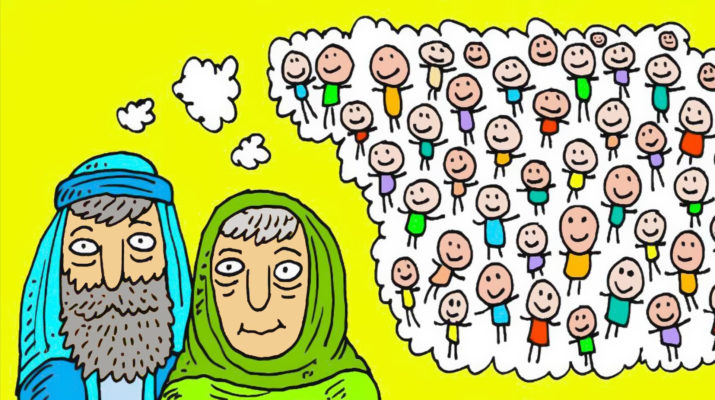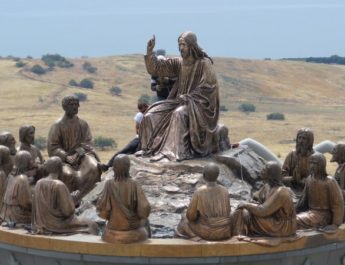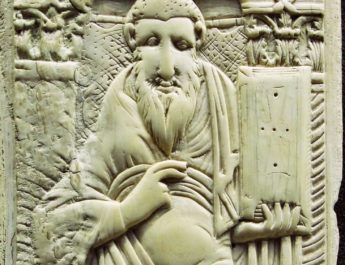Genesis 17:1-7, 15-16
Lent B14
BibleHub
1 When AbramA was ninety-nine years old, the LordB appearedC to Abram,
Notes on verse 1a
A “Abram” = Abram. From the same as Abiram (exalted father, a high father – lofty) {from ab (father literal or figurative) + rum (rise, bring up, being high, extol, exalt, haughty; to raise in a literal or figurative sense)}. This is Abram, exalted father.
B “Lord” = YHVH. From havah (to be, become) or hayah (to come to pass, become, be). This is the name of the God of Israel, the self-existent and eternal one, the tetragrammaton. This pronunciation has been lost to time so “Lord” is generally used in its place.
C “appeared” = raah. This is to see in a literal or figurative sense so stare, advise, think, view.
and said to him, “I am GodD Almighty;E walkF beforeG me, and be blameless.H
Notes on verse 1b
D “God” = El.
E “Almighty” = Shaddai. Perhaps from shadad (to ruin, assault, devastate, oppress, destroy completely; properly, it is being burly; figuratively it is something that is powerful) OR from shed (protective spirit) OR shadah (to moisten) OR shad (breast). Perhaps meaning almighty, “my destroyer,” “my protective spirit,” “my rainmaker,” “self-sufficient, “who is abundantly,” or “breasted one” – as the one who abundantly provides or grants fertility/abundance to humans. See https://www.abarim-publications.com/Meaning/Shaddai.html#.Xxi6Ep5KhPY
F “walk” = halak. This is go, come, walk. It is walk literally and figuratively and includes people and animals. It can be used figuratively for one’s moral life – how we walk according to God’s way or against it. It can also refer to the walk of life as in the course one’s life takes, the choices we make, etc.
G “before” = paneh. From panah (to turn, face, appear). This is face in a literal or figurative sense. It could be face, presence, anger, respect. It can also be used of God to indicate divine favor or presence.
H “blameless” = tamim. From tamam (to finish or accomplish; to make perfect, demonstrate that you are upright; consume; to complete in a literal or figurative sense). This is ecntire in a literal or figurative sense. So, it could be complete, full, intact, or without defect. Alternately, it could refer to being sound, having integrity, being sincere or perfect.
2 And I will makeI my covenantJ between me and you, and will make you exceedingly numerous.”K
Notes on verse 2
I “make” = natan. This is to give, put, set, offer. It is to give literally or figuratively.
J “covenant” = berit. Perhaps from barah (to eat, choose, make clear); perhaps from bar (grain, wheat); from bara (to select, purify, cleanse, test, brighten, polish). This is a compact, covenant, alliance, treaty, or league.
K “make…numerous” = rabah. This is increasing in any aspect whether quantity, authority, size, quality, greatness, etc.
3 Then Abram fellL on his face;M and GodN saidO to him,
Notes on verse 3
L “fell” = naphal. This is to fall, whether by accident, to fall prostrate, or to fall in violent death. Figuratively, it can refer to personal ruin or calamity, a city falling, an attack or a falling away. It can also be a deep sleep or wasting away.
M “face” = paneh. Same as “before” in v1. See note G above.
N “God” = Elohim.
O “said” = dabar. This is generally to speak, answer, declare, or command. It might mean to arrange and so to speak in a figurative sense as arranging words.
4 “As for me,P this is my covenant with you: You shall be the ancestorQ of a multitudeR of nations.S
Notes on verse 4
P {untranslated} = hinneh. From hen (lo! Behold! If, though; an expression of surprise). This is to draw attention, show suddenness or surprise, or to emphasize the importance of the coming statement. See! Lo! Behold!
Q “ancestor” = ab. Related to “Abram” in v1. See note A above.
R “multitude” = hamon. From hamah (to growl, cry out, be moved, murmur, hum, mourn, rage, clamor). This is a sound, noise, roar, rumbling, wealth, crowd, disquietude.
S “nations” = goy. From the same root as gevah (the back, person, or body); related to gev (among); related to gaah (to rise up). This is nation or people. Often used to refer to Gentiles or foreign nations. It can also be used figuratively for a group of animals. This is where the Yiddish “goy” comes from.
5 No longer shall your nameT beU Abram, but your name shall be Abraham;V for I have made you the ancestor of a multitude of nations. 6 I will make you exceedingly fruitful;W and I will make nations of you, and kings shall come from you.
Notes on verses 5-6
T “name” = shem. May be from sum (to put, place, set). This is name, fame, renown. A name was thought to indicate something essential about a person – something about their individuality. So, this word can also mean honor, authority, or character.
U “be” = qara. This is to call or call out – to call someone by name. Also used more broadly for calling forth.
V “Abraham” = Abraham. Related to “Abram” in v1 & “ancestor” in v4. From the same as Abiram (exalted father, a high father – lofty) {from ab (see note A above) + rum (see note A above)}. This is Abraham, father of many nations or father of a multitude.
W “make…fruitful” = parah. This is to bear fruit, grow, be fruitful, increase. It is bearing fruit in a literal or figurative sense.
7 I will establishX my covenant between me and you, and your offspringY after you throughout their generations,Z for an everlastingAA covenant, to be GodBB to you and to your offspring after you.
Notes on verse 7
X “establish” = qum. To arise, stand, accomplish, establish, abide. This is rising as in rising against, getting up after being sick or asleep, arising from one state to another, becoming powerful, or rising for action. It can also be standing in a figurative sense.
Y “offspring” = zera. From zara (to sow or scatter seed; conceive or yield). This is seed or sowing. It can, thus, mean a fruit, plant, sowing time, child, offspring, or posterity.
Z “generations” = dor. From dur (to move in a circle, which implies living somewhere or remaining there; it can also be the sense of piling or heaping up). This is a revolution of time, which is to say, an age or generation. It can also be a dwelling or one’s posterity.
AA “everlasting” = olam. This is a long scope of time whether in the past (antiquity, ancient time) or in the future (eternal, everlasting).
BB “God” = Elohim. Same as “God” in v3. See note N above.
15 GodCC said to Abraham, “As for SaraiDD your wife,EE you shall not callFF herGG Sarai, but SarahHH shall be her name.
Notes on verse 15
CC “God” = Elohim. Same as “God” in v3. See note N above.
DD “Sarai” = Saray. 17x in OT. From the same as sar (chief, ruler, lord, official, governor, prince; someone at the top of a rank or class). This is Sarai, which means princess or ruler.
EE “wife” = ishshah. From ish (man); perhaps from enosh (human, humankind, mortal); from anash (to be weak, sick, or frail). This is woman, wife, or female.
FF “call” = qara. Same as “be” in v5. See note U above.
GG {untranslated} = shem. Same as “name” in v5. See note T above.
HH “Sarah” = Sarah. Related to “Sarai” in v15. From the same as Saray (see note DD above). This is Sarah, meaning princess or ruler.
16 I will blessII her, and moreover I will giveJJ you a son by her. I will bless her, and she shall give rise to nations; kings of peoplesKK shall come from her.”
Notes on verse 16
II “bless” = barak. This is to kneel, to bless. It is blessing God as part of worship and adoration or blessing humans to help them. It can be used as a euphemism to say curse God.
JJ “give” = natan. Same as “make” in v2. See note I above.
KK “peoples” = am. From amam (to darken, hide, associate; creating shadows by huddling together). This is people or nation. It can be used specifically for a tribe, collectively of troops or armies, or figuratively to refer to a flock of animals.
Image credit: “God’s Promise to Abram” by Jill Kemp & Richard Gunther of Lambsongs.




